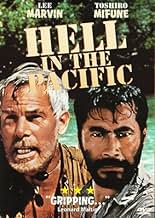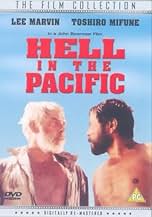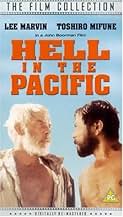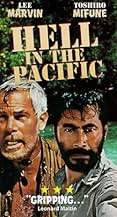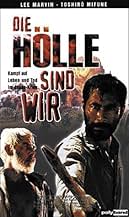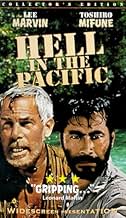IMDb RATING
7.2/10
9.5K
YOUR RATING
During World War II, an American pilot and a marooned Japanese navy captain are deserted on a small uninhabited island in the Pacific Ocean. There, they must cease their hostility and cooper... Read allDuring World War II, an American pilot and a marooned Japanese navy captain are deserted on a small uninhabited island in the Pacific Ocean. There, they must cease their hostility and cooperate if they want to survive, but will they?During World War II, an American pilot and a marooned Japanese navy captain are deserted on a small uninhabited island in the Pacific Ocean. There, they must cease their hostility and cooperate if they want to survive, but will they?
- Director
- Writers
- Stars
- Awards
- 1 win & 2 nominations total
Toshirô Mifune
- Captain Tsuruhiko Kuroda
- (as Toshiro Mifune)
Featured reviews
During the Second World War, on a small, inhospitable island somewhere in the Pacific Ocean, two men are stranded. One is an American Pilot, the other a Japanese Naval Captain. When they become aware of each other's presence, their military training kicks in, and the two begin to battle. However, it soon becomes painfully clear that neither man will survive the island without the other's help. Whether or not they are able to set aside their differences and work together, or destroy one another for the glory of their nation, remains to be seen in John Boorman's powerful anti-war allegory, 'Hell in the Pacific.'
Boorman's third feature film, 'Hell in the Pacific' tells a relatively simple tale- arch-enemies forced to unite under circumstances beyond their control- in an astute and subtle manner. It is a quiet movie featuring characters given to introspection- often there is very little dialogue. A lot is said in that silence however, through the striking visuals, with the thick atmosphere, and by the presence and physicality of stars Lee Marvin and Toshiro Mifune. There are moments of levity, and it's a very suspenseful watch; but at its heart 'Hell in the Pacific' is a barbed treatise.
Through the understated story- written by Reuben Bercovitch, Alexander Jacobs, Eric Bercovici and Shinobu Hashimoto- a clear, humane message about the indignities and pointlessness of war emerges, and no side is given preferential treatment, no bias is injected into the screenplay. 'Hell in the Pacific' is a masterful war film- or anti-war film, one should say. For that is the crux of the narrative and the center of the allegory that 'Hell in the Pacific' is: war is hell, and there's no war when rivals unify; an aphorism bordering on the trite, but one that is apt nevertheless.
A highly visual experience, 'Hell in the Pacific' features fine, striking cinematography from Conrad Hall. Hall's work lends to the film something of a dream-like atmosphere, though is still firmly rooted in the naturalistic tradition. It is dramatic camera-work that lingers in the memory long after the film has ended. Boorman's films are always visually stimulating affairs, and 'Hell in the Pacific' ranks as one of his most rich, stylish and gritty.
Thomas Stanford's editing is sharp, establishing the film's pace, which is steady and smooth; though not overly brisk or without moments of sedation. Many critique the unexpected abruptness of the ending, but it is in keeping with the tone and themes the film tries to explore. Lalo Schifrin's muted, melodic score contributes to this tone, bringing to the film additional beauty, as well as additional devastation and impact.
'Hell in the Pacific'- for all of the merits listed above- could easily have faltered had casting gone in a different direction. Thankfully, Marvin and Mifune were secured, and deliver performances of incredible intensity, humor and depth. Marvin is too often remembered as an action star or a heavy, when in reality his talents extended far beyond that. He brought a charm and sense of purpose to every role he played, as well as an ease of performance that makes him mesmerizing on screen. His performance in 'Hell in the Pacific' is up there with his equally powerful one in 'Monte Walsh'; work of extreme emotional perspicuity that is most underrated.
Any film fan knows of the immeasurable talents of Toshiro Mifune. He could play any kind of character: drunkards, gangsters, fools- all with Shakespearean intensity. He also possessed masterful comedic timing, as well as being one of the most skillful expressionistic figures to ever grace the cinema screen. His performance in 'Hell in the Pacific' is understated, captivating and powerful; probably the best he ever gave in a production outside of Japan. He and Marvin share an electric chemistry that makes watching them on screen a real pleasure.
'Hell in the Pacific' is a masterful movie, a subtle story told with verve and intelligence. Deftly directed by John Boorman, beautiful in terms of visuals and featuring a fine Lalo Schifrin score, the film is utterly unforgettable. Lee Marvin and Toshiro Mifune deliver two brilliant performances that are highlights in both their careers. Hard-hitting and containing allegorical depth; there are few anti-war films as impactful. In short, 'Hell in the Pacific' is heaven in the cinema.
Boorman's third feature film, 'Hell in the Pacific' tells a relatively simple tale- arch-enemies forced to unite under circumstances beyond their control- in an astute and subtle manner. It is a quiet movie featuring characters given to introspection- often there is very little dialogue. A lot is said in that silence however, through the striking visuals, with the thick atmosphere, and by the presence and physicality of stars Lee Marvin and Toshiro Mifune. There are moments of levity, and it's a very suspenseful watch; but at its heart 'Hell in the Pacific' is a barbed treatise.
Through the understated story- written by Reuben Bercovitch, Alexander Jacobs, Eric Bercovici and Shinobu Hashimoto- a clear, humane message about the indignities and pointlessness of war emerges, and no side is given preferential treatment, no bias is injected into the screenplay. 'Hell in the Pacific' is a masterful war film- or anti-war film, one should say. For that is the crux of the narrative and the center of the allegory that 'Hell in the Pacific' is: war is hell, and there's no war when rivals unify; an aphorism bordering on the trite, but one that is apt nevertheless.
A highly visual experience, 'Hell in the Pacific' features fine, striking cinematography from Conrad Hall. Hall's work lends to the film something of a dream-like atmosphere, though is still firmly rooted in the naturalistic tradition. It is dramatic camera-work that lingers in the memory long after the film has ended. Boorman's films are always visually stimulating affairs, and 'Hell in the Pacific' ranks as one of his most rich, stylish and gritty.
Thomas Stanford's editing is sharp, establishing the film's pace, which is steady and smooth; though not overly brisk or without moments of sedation. Many critique the unexpected abruptness of the ending, but it is in keeping with the tone and themes the film tries to explore. Lalo Schifrin's muted, melodic score contributes to this tone, bringing to the film additional beauty, as well as additional devastation and impact.
'Hell in the Pacific'- for all of the merits listed above- could easily have faltered had casting gone in a different direction. Thankfully, Marvin and Mifune were secured, and deliver performances of incredible intensity, humor and depth. Marvin is too often remembered as an action star or a heavy, when in reality his talents extended far beyond that. He brought a charm and sense of purpose to every role he played, as well as an ease of performance that makes him mesmerizing on screen. His performance in 'Hell in the Pacific' is up there with his equally powerful one in 'Monte Walsh'; work of extreme emotional perspicuity that is most underrated.
Any film fan knows of the immeasurable talents of Toshiro Mifune. He could play any kind of character: drunkards, gangsters, fools- all with Shakespearean intensity. He also possessed masterful comedic timing, as well as being one of the most skillful expressionistic figures to ever grace the cinema screen. His performance in 'Hell in the Pacific' is understated, captivating and powerful; probably the best he ever gave in a production outside of Japan. He and Marvin share an electric chemistry that makes watching them on screen a real pleasure.
'Hell in the Pacific' is a masterful movie, a subtle story told with verve and intelligence. Deftly directed by John Boorman, beautiful in terms of visuals and featuring a fine Lalo Schifrin score, the film is utterly unforgettable. Lee Marvin and Toshiro Mifune deliver two brilliant performances that are highlights in both their careers. Hard-hitting and containing allegorical depth; there are few anti-war films as impactful. In short, 'Hell in the Pacific' is heaven in the cinema.
I only discovered Hell in the Pacific after searching for Lee Marvin films as I have become enamored with his work as of late. I thought this was going to be a war movie from start to finish, which I'm not always a big fan of. I am glad to say I was surprised and very pleased with this film.
This is a rare work of film that uses two actors, limited dialog(half of it in Japanese), and only one location. There have been many attempts at making movies about people stranded on islands, but this one pulls it off in a way no other has.
Thsi is a film about not only survival, but overcoming prejudice towards ones sworn enemy in a time of war. It is about moving past the fears of what you do not know, and using what you do know and the basic need to survive to pull through and band together.
I was more enthralled by this movie with almost no dialog, than I have been with movies that have won screenplay Oscars. To me, this is an example that if you have the right actors, the right story, and the right setting, dialog is not always necessary.
This is a rare work of film that uses two actors, limited dialog(half of it in Japanese), and only one location. There have been many attempts at making movies about people stranded on islands, but this one pulls it off in a way no other has.
Thsi is a film about not only survival, but overcoming prejudice towards ones sworn enemy in a time of war. It is about moving past the fears of what you do not know, and using what you do know and the basic need to survive to pull through and band together.
I was more enthralled by this movie with almost no dialog, than I have been with movies that have won screenplay Oscars. To me, this is an example that if you have the right actors, the right story, and the right setting, dialog is not always necessary.
A Japanese naval officer and an American pilot find themselves stranded alone on a desert island during WWII. How would you react to being marooned with a dangerous enemy? This film is an obscure treasure that should be better known. I suspect that people are put off by the cheesy and unsuitable title. The film explores the evolving relationship of two men from different cultures as they each struggle to find the best way to survive. Their collective fate is an exploration of the human condition.
One outstanding feature of this film is that it is in both Japanese and English, intentionally without sub-titles. An American or Japanese audience could watch this film and appreciate its message. This duality serves to heighten the cultural differences between the two men, and it is cultural bias that is the true enemy.
Buy it, it's a keeper!
One outstanding feature of this film is that it is in both Japanese and English, intentionally without sub-titles. An American or Japanese audience could watch this film and appreciate its message. This duality serves to heighten the cultural differences between the two men, and it is cultural bias that is the true enemy.
Buy it, it's a keeper!
Anti-war movies have come in many shapes and sizes – from the shocking to the satirical, from the blunt to the oblique – but few are as simply effective as Hell in the Pacific. At turns suspenseful, mysterious, cartoonishly funny and touchingly human, it boils the conflict down to the adventures of two men on opposite sides forced to share an island, but rather than just being a trite allegory, it convincingly demonstrates the benefits of co-operation over competitiveness, and shows that mistrust and enmity are not necessarily innate.
Ignoring the ridiculously abrupt ending, Hell in the Pacific is excellent in its structure. Considering that the target audience is going to be English-speaking (although the experience would not be too diminished for a Japanese audience) the story is told in the beginning from the perspective of the Japanese man. The American character is a mere presence amid the trees, and the fact that we can understand him is of little consequence because he doesn't say much of relevance. The Toshiro Mifune character is more loquacious, even though most viewers won't know what he's saying, and Lee Marvin's relative quietness emphasises the wordless savagery of the first half. It's only as the picture progresses and the men become more amiable towards each that they become recognisably human characters. But even this is done more through imagery than words, giving us an equally good impression of the two of them despite the language barrier.
This telling from the Japanese point-of-view is also reinforced in the methods of director John Boorman, who often makes the camera Mifune's eyes or keeps him up front while Marvin lurks in the background. Other than that, Boorman's style as a director is like a love letter to Akira Kurosawa and Sergio Leone, the latter especially. He gives us gnarly close-ups, a dynamic rhythm and eye-catching tableaux such as the shot of Marvin and Mifune as they arrive on the second island, like statues about to leap into action. It is all very overtly stylised, but it is a pretty neat way of keeping this story of such simple elements constantly interesting and engaging.
Toshiro Mifune is well-known to even the most casual of foreign cinema buffs, being the favourite star of the aforementioned Kurosawa. It's nice to see him used well in this less familiar context. The only other non-Japanese picture I have seen him in is a bizarre British-made Western called Red Sun, which is incidentally one of the worst films I have ever seen. You notice, seeing him here opposite Lee Marvin, he is not a tall man, but he makes up for this with his strong presence and irascible energy. But it's not all about the rage. I like here his passively bemused responses when Marvin is ranting at him. Lee Marvin shows his easy capacity for turning a serious-sounding performance into something surprisingly comical, such as his acting out of throwing the stick and picking it up.
Appropriately for a movie of few words, music plays a big part in Hell in the Pacific. The Lalo Schifrin score is by turns haunting, playful, and sometimes teasingly melodramatic. It is an unusually big score for a movie that is otherwise so minimalist, but its constant variation and inventiveness suits the action very well. And, aside from the power of its message, this is part of what makes Hell in the Pacific so appealing. It is all of a piece, a mesmerising tone poem on a the fate of humanity.
Ignoring the ridiculously abrupt ending, Hell in the Pacific is excellent in its structure. Considering that the target audience is going to be English-speaking (although the experience would not be too diminished for a Japanese audience) the story is told in the beginning from the perspective of the Japanese man. The American character is a mere presence amid the trees, and the fact that we can understand him is of little consequence because he doesn't say much of relevance. The Toshiro Mifune character is more loquacious, even though most viewers won't know what he's saying, and Lee Marvin's relative quietness emphasises the wordless savagery of the first half. It's only as the picture progresses and the men become more amiable towards each that they become recognisably human characters. But even this is done more through imagery than words, giving us an equally good impression of the two of them despite the language barrier.
This telling from the Japanese point-of-view is also reinforced in the methods of director John Boorman, who often makes the camera Mifune's eyes or keeps him up front while Marvin lurks in the background. Other than that, Boorman's style as a director is like a love letter to Akira Kurosawa and Sergio Leone, the latter especially. He gives us gnarly close-ups, a dynamic rhythm and eye-catching tableaux such as the shot of Marvin and Mifune as they arrive on the second island, like statues about to leap into action. It is all very overtly stylised, but it is a pretty neat way of keeping this story of such simple elements constantly interesting and engaging.
Toshiro Mifune is well-known to even the most casual of foreign cinema buffs, being the favourite star of the aforementioned Kurosawa. It's nice to see him used well in this less familiar context. The only other non-Japanese picture I have seen him in is a bizarre British-made Western called Red Sun, which is incidentally one of the worst films I have ever seen. You notice, seeing him here opposite Lee Marvin, he is not a tall man, but he makes up for this with his strong presence and irascible energy. But it's not all about the rage. I like here his passively bemused responses when Marvin is ranting at him. Lee Marvin shows his easy capacity for turning a serious-sounding performance into something surprisingly comical, such as his acting out of throwing the stick and picking it up.
Appropriately for a movie of few words, music plays a big part in Hell in the Pacific. The Lalo Schifrin score is by turns haunting, playful, and sometimes teasingly melodramatic. It is an unusually big score for a movie that is otherwise so minimalist, but its constant variation and inventiveness suits the action very well. And, aside from the power of its message, this is part of what makes Hell in the Pacific so appealing. It is all of a piece, a mesmerising tone poem on a the fate of humanity.
Isolation in extreme conditions allows for very telling studies of human beings, and potentially unpleasant philosophical conclusions. Marooning a character on an island will get you some dramatic results, and the only way to take it a step further is to maroon that character's worst possible enemy with him. That's what Hell in The Pacific proposes.
This is not Cast Away Meets WWII. For one thing, it has a much tighter focus, completely losing anything beyond the island's horizon. It is admirable in its bloody-minded focus, and, with only two actors to cast, it's hard to imagine how it could have been any more perfect that pitching wild-man extraordinaire Lee Marvin opposite Kurosawa favorite Toshiro Mifune. A genius idea, but one that could have failed with a more conventional approach.
We are introduced to both antagonists in a neutral way, free to prefer which ever one we choose, though that is hardly the point, and director John Boorman makes it both easy and at times hard to sympathise with either in equal measure. Both actors do a fine job, playing mostly emotional and physical roles with great restrain and intelligence.
Boorman's direction is perfect, rejecting excess stylization in favor of a subtle approach, aided by superb photography. You have got to see this at least once, simply because, for all its visceral thrills, it is quite profound without ever trying to be. Because it boasts top performances from two of the last century's greatest leading presences in action cinema. Because, though frustrating at first, the ending is, for once, the smartest one that could have been chosen. Humanity is on trial and the judges choose to be honest and pragmatic, thus delivering something that combines greatness and very thoughtful substance.
We need more films like this!
This is not Cast Away Meets WWII. For one thing, it has a much tighter focus, completely losing anything beyond the island's horizon. It is admirable in its bloody-minded focus, and, with only two actors to cast, it's hard to imagine how it could have been any more perfect that pitching wild-man extraordinaire Lee Marvin opposite Kurosawa favorite Toshiro Mifune. A genius idea, but one that could have failed with a more conventional approach.
We are introduced to both antagonists in a neutral way, free to prefer which ever one we choose, though that is hardly the point, and director John Boorman makes it both easy and at times hard to sympathise with either in equal measure. Both actors do a fine job, playing mostly emotional and physical roles with great restrain and intelligence.
Boorman's direction is perfect, rejecting excess stylization in favor of a subtle approach, aided by superb photography. You have got to see this at least once, simply because, for all its visceral thrills, it is quite profound without ever trying to be. Because it boasts top performances from two of the last century's greatest leading presences in action cinema. Because, though frustrating at first, the ending is, for once, the smartest one that could have been chosen. Humanity is on trial and the judges choose to be honest and pragmatic, thus delivering something that combines greatness and very thoughtful substance.
We need more films like this!
Did you know
- TriviaBoth Lee Marvin and Toshirô Mifune actually served in the Pacific during World War II, of course on opposing sides. Marvin was a US Marine. He was wounded during the war and received the Purple Heart during the Battle of Saipan in 1944. Mifune served in the Imperial Japanese Army Air Service.
- GoofsLee Marvin was 44 at the time of filming, as evident by his gray hair. Toshiro Mifune's character also calls him an "old man" several times. WWII US Navy pilots Thus, he looks much too old for an actual WWII US Navy pilot, who were mostly in their twenties or early thirties.
- Quotes
American Pilot: Oh, for a second I thought you were a Jap.
- Alternate versionsAmerican version featured an alternative ending where the two get drunk and walk off in separate directions arguing at each other; in the British version (which was exactly the same as the Japanese version), they start yelling and a bomb from the sky falls and blows everything apart.
- ConnectionsFeatured in Hollywood Remembers Lee Marvin (2000)
- How long is Hell in the Pacific?Powered by Alexa
Details
Box office
- Budget
- $4,150,000 (estimated)
- Runtime
- 1h 43m(103 min)
- Aspect ratio
- 2.35 : 1
Contribute to this page
Suggest an edit or add missing content


